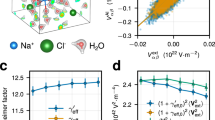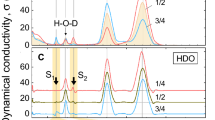Abstract
DILUTE solutions of deoxyribonucleic acid have high viscosity, very large increment of dielectric constant and high osmotic pressure. It has been suggested that these properties result from the formation of large hydration shells with a higher degree of lattice order than that prevailing in pure water1. In order to investigate these phenomena further, we have studied proton magnetic resonances of some deoxyribonucleic acid solutions and gels.
This is a preview of subscription content, access via your institution
Access options
Subscribe to this journal
Receive 51 print issues and online access
$199.00 per year
only $3.90 per issue
Buy this article
- Purchase on Springer Link
- Instant access to full article PDF
Prices may be subject to local taxes which are calculated during checkout
Similar content being viewed by others
References
Jacobson, B., Nature, 172, 666 (1953).
Gulland, J. M., Jordan, D. O., and Threlfall, C. J., J. Chem. Soc., 1129 (1947).
Arnold, J. T., Dharmatti, S. S., and Packard, M. E., J. Chem. Phys., 19, 507 (1951).
Author information
Authors and Affiliations
Rights and permissions
About this article
Cite this article
JACOBSON, B., ANDERSON, W. & ARNOLD, J. A Proton Magnetic Resonance Study of the Hydration of Deoxyribonucleic Acid. Nature 173, 772–773 (1954). https://doi.org/10.1038/173772a0
Issue Date:
DOI: https://doi.org/10.1038/173772a0
This article is cited by
-
Effect of temperature and solvents on ultrasonic speed and related acoustical thermodynamic parameters of epoxy resin of (2E,6E)-bis(4-hydroxybenzylidene)cyclohexanone solutions
Polymer Bulletin (2021)
-
Ultrasonic Speed and Related Thermo-acoustical Parameters of Solutions of 1,1′-Bis(3-methyl-4-ethoxyacetylphenoxy)cyclohexane at Four Different Temperatures
Journal of Solution Chemistry (2015)
-
Effect of Temperature and Solvent on the Ultrasonic Velocity and Allied Acoustical Parameters of the Epoxy Oleate of 9,9′-Bis(4-hydroxyphenyl) Anthrone-10 Solutions
Journal of Solution Chemistry (2011)
-
Plant metabolomics: analytical platforms and integration with functional genomics
Phytochemistry Reviews (2008)
-
Ultrasonic velocity and absorption on methylmetha acrylic resins
Proceedings / Indian Academy of Sciences (1989)
Comments
By submitting a comment you agree to abide by our Terms and Community Guidelines. If you find something abusive or that does not comply with our terms or guidelines please flag it as inappropriate.



